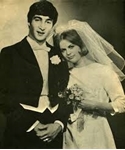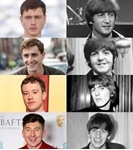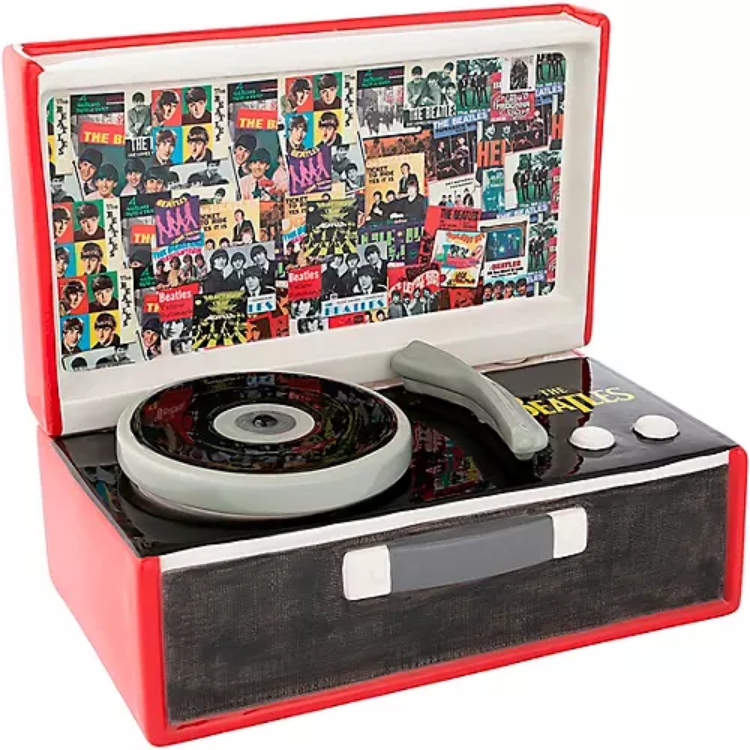- Register
- Log in to Tune-In
- Wishlist (0)
-
Shopping cart
(0)
You have no items in your shopping cart.
Beatles News

The Beatles drummer Ringo Starr, born Richard Starkey, married hairdresser Maureen Cox at Caxton Hall in London.
Beatles manager Brian Epstein served as Ringo’s best man, with John Lennon and George Harrison both acting as witnesses.
The couple had three children, future drummer Zak Starkey, born in 1965, Jason Starkey, born in 1967, and Lee Starkey, born in 1970.
The couple divorced in 1975. Cox died from leukemia in December of 1994.
Cox will be portrayed by British actress Mia McKenna-Bruce in Sam Mendes’ four Beatles films, The Beatles — A Four-Film Cinematic Event, which will hit theaters in April 2028. Starr will be played by Barry Keoghan.
In April 1981, Starr married actress Barbara Bach, who he met on the set of the film Caveman. They are still married to this day.
Source: Jill Lances/1430wcmy.com
details

From Liverpool to the world, The Beatles sang across nearly every genre and explored countless corners of the globe. The quintessential British quartet — John Lennon, Paul McCartney, George Harrison, and Ringo Starr — started out as a working-class band, juggling their music with blue-collar jobs. By the latter half of their careers, however, they had seen much of what the world had to offer, providing more than enough inspiration to write over 200 songs in just eight active years. One of those songs would later find an unexpected home with one of this generation's most influential pillars of pop culture: Marvel Comics. "The White Album" Jumped from British Blues to Country Tales Like "Rocky Raccoon". Surrounded by press, The Beatles wave at fans as they arrive in New York City in 1964.
"Rocky Raccoon" is far more narrative than introspective, telling the story of a young, feisty boy named Rocky Raccoon. Set in the "black mining hills of Dakota," the song follows Rocky after his woman runs off with another man, leaving him humiliated and nursing a black eye. Refusing to let the slight go, Rocky checks into a local saloon, armed with a gun, and storms into the room next to his. When he bursts details

Let’s begin today with some trivia. Who is the only performer to receive a separate guest credit on the label of a Beatles single?
You, the one yelling “Billy Preston!” loudly at the screen: You are correct. The 1969 “Get Back/Don’t Let Me Down” single is credited to “The Beatles With Billy Preston,” in honor of the virtuosic keyboardist responsible for that indelible Fender Rhodes solo.
Preston has been on my mind since the 2021 release of Peter Jackson’s docuseries “The Beatles: Get Back,” which served, among other things, as a reminder just how crucial the Texas-born keyboard prodigy was to the “Let It Be” sessions. (Given his effortless playing style and the good-natured way he diffused tension on the studio, John Lennon basically asked him to join the band.) But I’ve been listening to Preston, and specifically his Beatles covers, after catching a preview screening of Paris Barclay’s documentary about his charmed but troubled life, “Billy Preston: That’s the Way God Planned It,” which will be playing in New York later this month.
Preston’s covers got me thinking about how many fantastic & details

Even before the age of social media and the bottomless scroll, musicians were fighting against the general public’s relatively short attention span. (First impressions and all that.) More often than not, a listener would know whether they liked a song within the first few seconds, which made those first few seconds all the more important. And on February 11, 1963, The Beatles recorded a song introduction that would become synonymous with the group, all while calling back to a musical idol.
The Beatles recorded “I Saw Her Standing There” as part of an impressive recording session that saw the Fab Four record Please Please Me in one day. Although undoubtedly a big undertaking for the band and engineers alike, that big day in EMI Studios wasn’t entirely different from what The Beatles were already used to after cutting their teeth at nightclubs that expected them to play for hours on end. And it was just this kind of live feel that producer George Martin was after.
For this reason, Martin advised the band to count in their own numbers like they would if they were on stage. The end result is one of the most iconic intros in The Beatles discography and a subtle homage to the King of Rock &lsqu details

Oh, to be a fly on the wall in EMI Studios on February 10, 1967. If not for the superb vantage point, for the elbow room—it was a crowded affair in the recording room that day, with The Beatles, their star-studded group of pals, studio engineers, George Martin, and 41 professional symphonic musicians all in attendance. Everyone was there to put in some serious work, but one wouldn’t know it by looking at them. February 10 marked the fourth recording session for “A Day In The Life”, the expansive, controversial, and multi-faceted closing track to Sgt. Pepper’s Lonely Hearts Club Band. Members of the Royal Philharmonic and London Symphony Orchestras were there to record the cacophony that separates John Lennon’s somber first verses (“I read the news today, oh boy…”) with Paul McCartney’s bouncy interlude (“Woke up, jumped out of bed, ran a comb across my head.”)
The musical task at hand was a challenging one. Most conservatory musicians prefer structure, and The Beatles were after the opposite. But with the help of George Martin’s arranging skills and a vast assortment of gag accessories like clown noises, clip-on nipples, and gorilla paws, eve details

It is no secret that Paul McCartney and John Lennon had a competitive relationship. However, when we hear about this relationship, it’s typically through eyes that have not shared the same lived experience. In other words, it’s not being told through a professional musician’s perspective. That being so, facts are misinterpreted, moments are embellished, and ultimately, the foundational truth is partially lost. One musician with a similar disposition who once set the record straight on the matter was Paul Simon.
When it comes to the greatest songwriters of all time, Paul Simon is certainly one of them, and do you think he got there without a competitive drive? No, as competition is arguably embedded in every endeavor, obtaining a great ambitious mission. Now, that competition doesn’t necessarily need to be against another person, as that competition can also be simply against yourself.
Regarding this drive, Simon states in the book Paul Simon: The Life by Robert Hilburn, “I wanted my own parade. That’s a competitive drive I had, for whatever reason, whether it was in my nature or it came from my family or from my neighborhood — probably a father thing.” T details

On February 9, 1961, The Beatles—John Lennon, Paul McCartney, George Harrison, bassist Stuart Sutcliffe, and drummer Pete Best—made their debut at The Cavern Club in Liverpool, 65 years ago. This lunchtime performance marked the beginning of their 291-show residency at the venue, which was crucial for developing their stage presence before Ringo Starr joined in 1962.
Key details of this historical milestone:
The Lineup: The band featured the "Fab Five" lineup of Lennon, McCartney, Harrison, Sutcliffe, and Best.
The Gig: They played a lunchtime gig, reportedly earning £5, at the Mathew Street venue.
Significance: This performance helped establish them in the local scene, leading to their discovery by manager Brian Epstein.
Legacy: While Sutcliffe left soon after to pursue art and Best was replaced by Ringo Starr in August 1962, this 1961 date is considered a foundational moment in their rise to fame.
Source: Google
details
Barry Keoghan transformed into Ringo Starr as he was spotted filming scenes for the upcoming Beatles biopic.
The actor, 33, joins the cast as the legendary drummer alongside Paul Mescal as Paul McCartney, Harris Dickinson as John Lennon and Joseph Quinn as George Harrison. On Saturday, Barry looked the spitting image of the star, whose real name is Sir Richard Starkey, while on set.
He donned an oversized fur jacket layered over a striped purple shirt, paired with cropped trousers for the retro look. Barry also grew out a beard and styled his hair in Ringo’s classic shaggy cut, finishing the transformation with sunglasses as he filmed scenes.
The Daily Mail revealed that the Beatles biopics will be filmed at London's iconic Abbey Road Studios, with production getting underway in November last year despite earlier reports that plans had been blocked.
Barry Keoghan transformed into Ringo Starr as he was spotted filming scenes for the upcoming Beatles biopic. The actor, 33, joins the cast as the legendary drummer alongside Paul Mescal as Paul McCartney, Harris Dickinson as John Lennon and Joseph Quinn as George Harrison. While it was previously claimed that Westminste details

In 1964, the Beatles made their first live American television appearance on “The Ed Sullivan Show,” broadcast from New York on CBS. The quartet played five songs, including “She Loves You” and “I Want to Hold Your Hand,” to a crowd of screaming teenagers in person and more than 70 million viewers across the country.
Source: LimoOhio.com
details
In many ways, The Beatles remain the Platonic Ideal of a rock band. Not only did the Liverpool, England-born group write incredible songs and garner giant audiences, but they also broke the mold by breaking the molds. In other words, they were great, in part, because of their distinct personalities.
Each of the four former Mop Tops had specific qualities. And together, they were a complete group. But even despite the unbelievable synergy between the members, there were important musical figures who helped shape The Beatles from the outside. That’s just what we wanted to dive into here.
While the four members of The Beatles were in the recording studio, laying down their tracks, it was producer George Martin in the booth, working the boards and knobs. Where would the band be without his ear for levels and mixes? Where would they be without his influence? Just one example of Martin’s genius is his work on the 1967 album Sgt. Pepper’s Lonely Hearts Club Band.
Much has been written about Yoko Ono and her effect on John Lennon and The Beatles. For decades, she was considered the villain who broke up the band. But more recently, those ideas have been debunked thanks, in part, to f details

Cynthia Powell was the third child of Charles Powell, who worked for the electrical and engineering company GEC, and his wife, Lillian. She was born in the opening days of the Second World War, in Blackpool, to where her expecting mother had been evacuated from the family home in Liverpool along with other pregnant women. As a child, Cynthia was described as "shy, gentle, and studious", and her upbringing was much stricter than her future husband's.
The family later moved back to the Wirral, settling in the seaside town of Hoylake. Cynthia showed artistic flair, and after attending Liverpool's Junior Art School, and at the age of 11 won an art prize in a Liverpool Echo competition. She went on to study at the Liverpool College of Art in 1957 where she met John Lennon.
Cynthia married Lennon in 1962, just before the Beatles released their first single, Love Me Do, after discovering she was pregnant with Julian. The Beatles’ manager, Brian Epstein, was best man.
The marriage lasted just six years and ended after Cynthia reportedly returned home from a trip to Greece to find Lennon and Yoko Ono, in matching towelling robes, gazing at each other.
Cynthia started div details

aul McCartney announced a second surprise show at the Bowery Ballroom slated for Wednesday night, but tickets were quickly snapped up. The East Village venue was completely sold out by 11 a.m.
McCartney, 82, shocked New Yorkers on Tuesday afternoon when he announced plans to play the theater that night, making tickets only available in person at the box office. That show almost immediately sold out as well.
By Wednesday morning, people were more prepared, with lines outside the venue all morning in anticipation of a possible announcement, according to the music blog Brooklyn Vegan. The concert was set to begin at 6:30 p.m. McCartney is expected to be in town all week, as he is scheduled to be part of a 50th anniversary celebration on “Saturday Night Live” this weekend.
Tuesday night’s show in the tiny Bowery Ballroom, with hardly more than 550 people in attendance, included a full 22-song setlist from McCartney, along with plenty of chatter. “So, here we are,” McCartney said at the beginning with a grin. “Some little gig. New York. Why not?”
McCartney is famously no stranger to a surprise performance. In additi details

A brand-new companion album is on the way, created to sit alongside Man on the Run, the upcoming documentary exploring Paul McCartney and Wings’ remarkable rise through the 1970s. Directed by Academy Award–winner Morgan Neville, the film traces an era of bold creativity, reinvention, and the unstoppable spirit that defined the band’s journey.
To mark the announcement, fans can enjoy two previously unheard gems: 'Arrow Through Me (Rough Mix)' and 'Live and Let Die (Rockshow)', available exclusively on Amazon Music.
The documentary Man on the Run begins streaming worldwide on Prime Video from 27 February. We made what seemed like an impossible dream come true. - Paul
Ahead of the release of Paul McCartney: Man on the Run, the intimate new feature documentary by Oscar, Emmy, and Grammy Award-winning director Morgan Neville, exploring Paul McCartney’s creative rebirth after The Beatles’ breakup, Capitol Records, MPL Communications and UMG have announced details of a companion album titled, Man on the Run - Music from the Motion Picture Soundtrack.
The album includes all-time classics, hits and essential tracks from across Paul McCartney and Wings’ r details

10 "Savoy Truffle"
From 'The Beatles' (1968)
Without a doubt, The Beatles (sometimes called “The White Album”) is one of the most important rock albums of all time. It’s one of the wildest and most varied of all time, in a manner that still feels unparalleled within the realms of non-experimental music, since most of the tracks here are legitimate songs. There are a few points where things do get kind of experimental (see “Revolution 9”), but usually, it’s just out there because there are a whole variety of sub-genres covered from song to song.
9 "Run for Your Life"
From 'Rubber Soul' (1965)
To the credit of “Run for Your Life,” it is a successfully creepy song, but whether it was supposed to be truly horrifying is a bit harder to discern. It’s about a very intense man directing a series of statements toward his partner/girlfriend, saying he’d rather see her dead than with another man and stuff, and that if she did that, she should indeed “run for” her “life.”
Maybe it was supposed to be tongue-in-cheek or darkly funny, but the execution is off. It’s just a sour song that really tanks the album it bel details

Beatlemania … in 2026?! Thanks to director Sam Mendes’s upcoming four-part Beatles film series, the Liverpool band is about to become the biggest music act in the world once again. The hubbub is certainly thanks, in large part, to its all-star cast. The Beatles films will star Paul Mescal (Hamnet) as Paul McCartney, Harris Dickinson (Babygirl) as John Lennon, Joseph Quinn (Fantastic Four: First Steps) as George Harrison, and Barry Keoghan (Saltburn) as Ringo Starr. With a lineup that good, the hysteria starts to make sense.
Fans got their first taste of the foursome through a London higher-education postcard event—which revealed the first official images of the actors as their famous counterparts. Released by the Liverpool Institute for Performing Arts (LIPA), which McCartney cofounded, the photos of Mescal, Dickinson, Keoghan, and Quinn were met with immediate excitement. I mean, it doesn’t get more spot-on than Mescal’s McCartney.
Now set photos from one of the films are leaking on social media, showing the four Beatles swarmed in New York City in the mid-’60s. Keoghan poses as Starr snapping photos, while Quinn’s Harrison attempts to trudge through the crowd to their details

